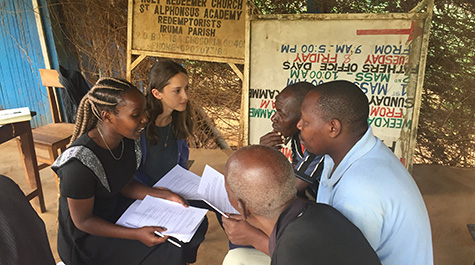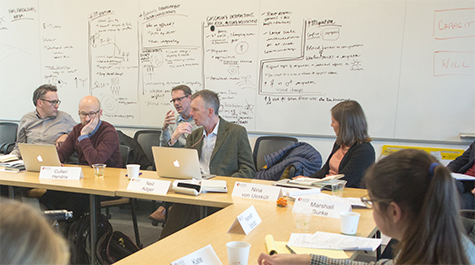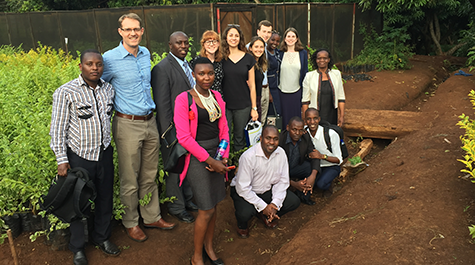《自然》:气候变化在武装冲突中的作用
In the fall of 2016, during the waning months of Barack Obama’s presidency, the White House released a memorandum titled “Climate Change and National Security.”
The memo was a federal mandate to consider the impacts of climate change in the development of national security-related doctrine, policies and plans. It warned that the effects of climate change could lead to “population migration within and across international borders, spur crises, and amplify or accelerate conflict in countries or regions already facing instability and fragility.”
But exactly what size role does climate change play in civil unrest? A new study aims to find out. The consensus among experts featured in the study is that climate change is often an important contributing factor in the outbreak of armed conflict, but economic, political and social issues often overshadow it.
The experts also say that the impacts of climate change can fan smoldering conflicts into all-out conflagrations. Further, the paper warns that as the negative environmental effects on agriculture, water and other necessities increase, climate change could become a more important cause of armed strife.
The study, “Climate as a risk factor for armed conflict,” was published today in the journal Nature. The paper features analysis from 11 climate and conflict experts from fields such as political science, environmental science and economics. Philip Roessler, associate professor of government at William & 玛丽 and co-director of the Center for African Development, is one of the experts and co-authors on the paper.
The expert elicitation was spearheaded by Katharine Mach at Stanford University’s Woods Institute for the Environment with the goal of assembling experts with divergent views to assess the impact of climate change on armed conflict to date and over the next century.
“This represents the key innovation of our methodology and contribution,” Roessler said. “It brought together an interdisciplinary group of scholars with different perspectives on this important question.”
The experts systematically read nearly all scholarship written on the climate change-conflict connection and independently assessed the impact of climate change on conflict risk, Roessler explained. Then the group of experts participated in six to eight-hour individual interviews followed by a two-day group deliberation.
While the experts agree that climate has affected organized armed conflict in recent decades, they make clear that other factors, such as low socioeconomic development, the strength of government, inequalities in societies and a recent history of violent conflict, are “substantially more influential” than climate change in driving conflict to date.
“Existing scholarship has tended to study the impact of climate change on conflict in isolation of other conflict drivers,” Roessler said. “This is problematic in assessing the relative effects of climate variability versus other causes of civil war, such as low socio-economic development or group inequality.”
Consider the case of the 2003 outbreak of the Darfur civil war, which Roessler has studied extensively during almost two years of fieldwork in Sudan and analyzed in his book “Ethnic Politics and State Power in Africa: The Logic of the Coup-Civil War Trap.”
“Many referred to the Darfur civil war as the ‘first climate-change conflict,’” Roessler said. “But while climate variability may have contributed somewhat to conflict risk in the western region of Sudan, the most significant drivers of the conflict were ethno-political exclusion, weak state capabilities and inter-group inequality.”
Darfur may be the first, but it’s not the only intranational conflict driven at least partially by climate change: The experts estimate that three to 20 percent of the risk of violent armed conflict within countries has been influenced by climate over the last century. None of the experts, who all serve as co-authors of the study, ruled out the role of climate in 10 percent of conflict risk.
The study also found that climate change could impact agricultural production, economies, and even inequities among groups, all of which can interact with other conflict drivers to potentially increase risks of violence.
“This is what makes the future scenarios potentially explosive,” Roessler said. “Rising temperatures and irregular rainfall have a direct impact on conflict risk by reducing agricultural yields and increasing the allure of joining an armed group to make a living. But it can also have significant second-order effects, reducing socioeconomic development, further weakening state capabilities and increasing intergroup inequality.”
Roessler says there is an urgent need to identify interventions and policies to prevent the outbreak of war by strengthening communities’ resiliency to climate change. One such intervention is crop insurance. Roessler, supported by a Reves Center Faculty Fellowship, recently returned from Kenya with a group of five W&M undergraduates, where they worked with a research team from Chuka University to study the low number of insured smallholder farms in Mount Kenya.
这个项目是由W&M大学的学生发起的,作为全球研究所鲨鱼坦克竞赛的一部分,旨在更好地了解如何增加作物保险的需求和吸收,以及它在减少气候引起的冲突方面的功效。这是罗斯勒和他在非洲发展中心的研究团队将继续研究的课题。在任何关于气候变化的讨论中,不确定性都是一个关键的警告。该研究指出,气候影响冲突的机制以及这些机制在什么条件下实现,目前还只是部分了解。尽管如此,该论文指出,专家们一致认为,“据估计,气候变化加剧将增加未来冲突的风险。”根据这项研究,目前,气候变率和变化估计大大增加了全球5%冲突的风险。随着全球平均气温上升2摄氏度——这是《巴黎气候协定》规定的目标水平——冲突的风险增加到13%。该研究预测,如果地球气温上升4度,气候对冲突的影响将增加5倍以上,达到26%。罗斯勒解释说,如果社会不大幅减少排放,这就是预测的变暖水平。“日益恶化的气候变化将使各国更加难以共同预防和遏制冲突,”罗斯勒说。“气候变化不仅会增加冲突风险,还会削弱我们控制和预防冲突的能力。”
该论文的其他共同作者隶属于以下机构:斯坦福大学、埃克塞特大学、奥斯陆和平研究所、挪威科技大学、国家经济研究局、丹佛大学、安特卫普大学、兰开斯特大学、科罗拉多大学博尔德分校、气候变化与安全研究小组(CLISEC)、汉堡大学和乌普萨拉大学。



















